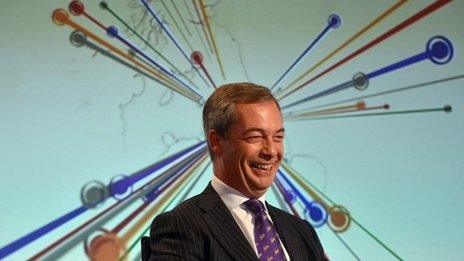Local elections: What does UKIP stand for?
- Published

The UK Independence Party's unique selling point - the policy it is best known for - is Britain's withdrawal from the European Union. But as the party has sought to broaden its appeal beyond that single issue, it has developed a full range of policies in all areas.
They can broadly be seen as right wing, with a strong libertarian flavour and a dash of social conservatism. But the party has also adopted some policies discarded by the left, such as student grants. This has led critics to say it is simply a shopping list of populist positions that have not been properly costed - something denied by the party.
UKIP is still in the process of formulating the platform on which it will fight the next general election but here is some of what we know so far:
EUROPE: Nigel Farage says he wants an "amicable divorce" from the European Union. Britain would retain trading links with its European neighbours but would withdraw from treaties and end subscription payments, adopting a similar relationship with the EU to Norway or Switzerland.
IMMIGRATION: An end to the age of "mass uncontrolled immigration". It wants a five year freeze on immigration for permanent settlement - and any future migration must be strictly limited to those who can "clearly be shown to benefit the British people as a whole and our economy". Immigrants would not be able to apply for public housing or benefits until they had paid tax for five years. In order to achieve these goals Britain would have to leave the EU because there are no restrictions on other EU citizens moving to the UK while it remains a member.
TAX: UKIP favours a flat tax - a single combined rate of income tax and national insurance paid by all workers. It claims this would end the complexity of the current system and allow people to keep more of the money they have earned. It would also lead to a major shrinking of the size of the state, which would revert to a "safety net" for the poorest. The party has yet to decide the rate at which the flat tax would be levied. Its policy at the 2010 election was 31% but a recent policy paper suggested 25%. It is having an internal debate about whether there should be two rates.
EDUCATION: UKIP backs selection by ability and would encourage the creation of new grammar schools. It would give parents vouchers to spend in the state or private education sector. It also advocates the return of the student grant system to replace loans.
HEALTH: UKIP says it has no plans to fundamentally change the NHS - it would, however, shrink the Department of Health and hand control to locally elected County Health Boards. It would also restore "traditional" non-university training for nurses.
DEFENCE: According to a recent policy paper, UKIP would increase defence spending back to 2010 levels. It would build more warships and carry out an urgent review of the case for replacing Trident, including the option of a new British-built nuclear missile system capable of launch from air, sea or sub-surface vessels.
ENERGY AND CLIMATE CHANGE: UKIP is sceptical about the existence of man-made climate change and would scrap all subsidies for renewable energy. It would also cancel all wind farm developments. Instead, it backs the expansion of shale gas extraction, or fracking, and a mass programme of nuclear power stations.
GAY MARRIAGE: UKIP supports the concept of civil partnerships, but opposes the move to legislate for same-sex marriage, which it says risks "the grave harm of undermining the rights of Churches and Faiths to decide for themselves whom they will and will not marry".
LAW AND ORDER: UKIP would double prison places and protect "frontline" policing to enforce "zero tolerance" of crime.
THE ECONOMY: UKIP is proposing "tens of billions" of tax cuts and had set out £77bn of cuts to public expenditure to deal with the deficit.
TRANSPORT: UKIP says it is the only political party to oppose the High Speed 2 (HS2) rail line arguing it will destroy countryside for little economic gain. It also opposes a third runway at Heathrow, arguing instead for an expansion of Manston airport, in Kent.
SOCIAL ISSUES: UKIP has been vocal in its opposition to what it sees as "political correctness" in public life. It also argues that multiculturalism has "split" British society. It would legislate to allow smoking in pubs, in designated rooms, and hold local referendums on repealing the hunting ban.
DEMOCRACY: The party wants binding local and national referendums on major issues.